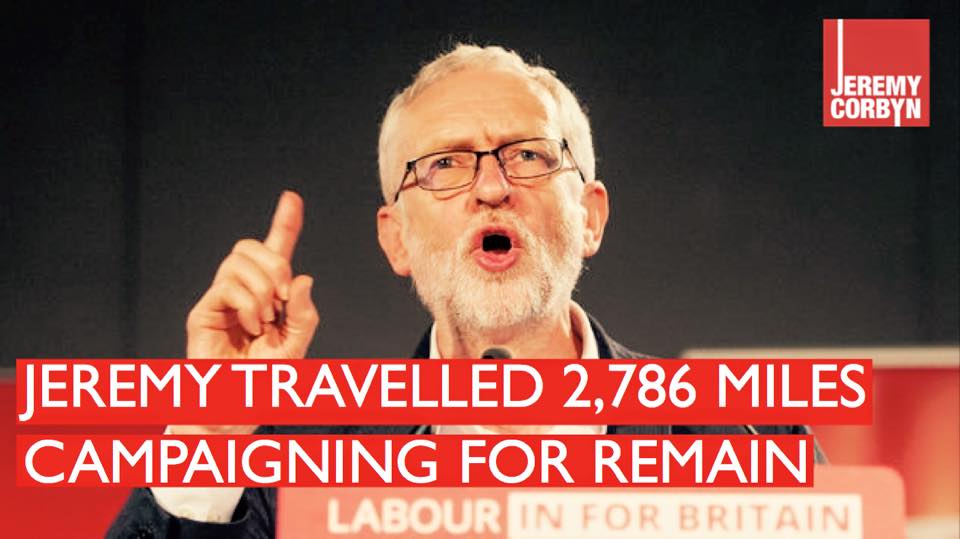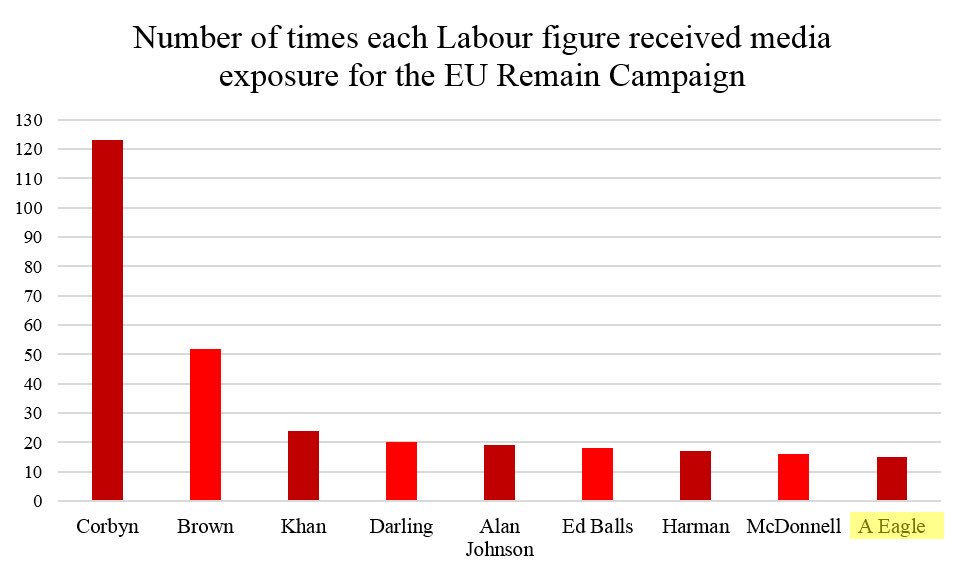My crisis of confidence over economist’s political arguments
Isn’t it a shame when the commentators in which we put our trust let us down?
In the case of Simon Wren-Lewis, that shame is doubled. His Mainly Macro blog has been one of the sources This Writer has been using to understand the economic policies of our politicians, but recent columns have led me to doubt my faith in him.
Look at the latest piece, which asks whether we can trust Jeremy Corbyn over Europe.
My first reservation about it is that Liz McInnes is prayed in aid of Professor Wren-Lewis’s case at the very start. He writes:
When the vote of no confidence happened immediately after Brexit, I suspect the thoughts of most Labour Party members were similar to those of MP Liz McInnes: what a stupid and inappropriate time to have another election (as indeed it was).
But This Writer has already established that Ms McInnes’s case is contradictory and incoherent – raising concerns that Prof Wren-Lewis might be heading in the same direction.
And so he is. Like Ms McInnes (because of her?) he tries to claim that the vote of ‘no confidence’ in Jeremy Corbyn happened as a result of the EU referendum vote – for ‘Brexit’.
The vote of no confidence was the result of Brexit. You can tell yourself that was because the ‘plotters’ thought it would be to their advantage, but why would that be? Forget issues about effort and holidays. The crucial question is whether Corbyn’s heart was ever in the Remain campaign, and whether (perhaps as a result) his campaign was flawed, or perhaps even counterproductive. I do not know the answer to the heart question, except to say that a lot of the points Corbyn supporters make about Smith’s past could be used to suggest Corbyn was in truth more ambivalent than he says he was.
This is nonsense speculation proceeding from a false premise. The vote was not the result of Brexit. We all know very well that there certainly was a ‘plot’ among Labour MPs to remove Jeremy Corbyn from the Labour leadership, certainly since April, possibly dating back as far as September last year when it was announced that he had won that position. This Blog has published some evidence to that effect.
“Forget issues about effort and holidays. The crucial question is whether Corbyn’s heart was ever in the Remain campaign.” Good question – but of course, issues about effort must be considered because you don’t put a lot of effort into something if your heart isn’t in it. So how much effort did Corbyn put in?
Here’s the distance he travelled, drumming up support:
And here’s the amount of media exposure he managed to generate, compared with that of other leading figures:
Note that Alan Johnson, who was supposed to be in charge of Labour’s ‘Remain’ campaign, only managed a fraction as much – less than one-sixth. Whose heart are we saying wasn’t in it, again?
So, no lack of enthusiasm in campaigning, then – and of course, Corbyn persuaded more Labour members and supporters to vote ‘Remain’ than any other party or campaign leader.
It’s at this point that Prof Wren-Lewis turns to economic arguments and says Corbyn trashed a speech by George Osborne, warning of the adverse economic impact of Brexit. This is the only part of his article that makes sense, because we had a preview of the effects of Brexit in the falling value of the pound immediately after it became clear ‘Leave’ was going to win.
But this is just one element, and Prof Wren-Lewis almost instantly dishonours it by combining it with the now-thoroughly-debunked claim that Corbyn demanded immediate invocation of Article 50, to de-couple from the EU, the day after the referendum.
So we can see that, while Corbyn may have disagreed with economic forecasts, he travelled further and campaigned harder than any other ‘Remain’ leader, brought in the votes, and claims made about his subsequent behaviour are untrue.
From this, Prof Wren-Lewis makes and entirely unsupportable leap of faith, claiming:
The 48% of people who voted to Remain, plus any more who voted Leave but are now beginning to wonder that maybe all those economists were not exaggerating about its impact, plus the majority of companies that want to Remain, plus all the overseas governments that want the UK to remain, will be looking to someone or some party to be their political representative over the next few years. Labour under Owen Smith could play that role for sure, but Labour under Jeremy Corbyn? A leader whose heart may not be in it and who has said the costs of Brexit are exaggerated and who only has 20% of MPs who have confidence in him and who isn’t very good at doing the parliamentary thing or the details about Brexit policy thing is hardly a good choice to champion this cause. And if Labour members feel that way, voters will feel the same, and can UK politics persist with the two major parties accepting Brexit and leaving the 48%+ unrepresented?
Let’s just tackle the big problem with this:
The result of the referendum was that the UK should leave the European Union. It doesn’t matter who does the negotiating – that will be the end result. Both major parties have to accept it – or does Prof Wren-Lewis advocate abandoning democracy?
The fact is that Jeremy Corbyn’s position is perfectly acceptable in the context of Brexit negotiations. He would argue for the best deal possible – not just for those who voted Leave but for those who voted Remain as well. Contrast that with the Tories, who have very narrow interests that will not take account of the effect on the vast majority of the population, and you’ll see that Prof Wren-Lewis is presenting a false argument.
The icing on the cake is the second person Prof Wren-Lewis prays in aid of himself – Alex Andreou. Alex has become rather embittered in recent weeks because people like This Writer have refused to accept his arguments against Mr Corbyn, preferring to present factual evidence that supports him against his detractors instead. Here‘s an article that debunks Alex.
So you see, there’s very little substance to the Mainly Macro attack on Corbyn over Europe.
With concrete evidence against many of the assertions, it clearly adopts a position I can’t support.
How, then, can I trust anything else that’s written here?
Source: mainly macro: Can we trust Jeremy Corbyn over Europe?
ADVERT
Join the Vox Political Facebook page.
If you have appreciated this article, don’t forget to share it using the buttons at the bottom of this page. Politics is about everybody – so let’s try to get everybody involved!
Vox Political needs your help!
If you want to support this site
(but don’t want to give your money to advertisers)
you can make a one-off donation here:
Buy Vox Political books so we can continue
fighting for the facts.
Health Warning: Government! is now available
in either print or eBook format here:
The first collection, Strong Words and Hard Times,
is still available in either print or eBook format here:









You trust someone as a source until he questions Jez? At which point he becomes persona non grata? You are priceless, Mike. Richard Murphy, Owen Jones and many others must be in your bad books too.
See, this is why your comments are worthless, Phil. You try to twist the things I say.
NO.
I’ll trust a source as long as I can trust what they’re saying. With Simon Wren-Lewis I could prove his claims were inaccurate, and that meant I could not longer trust the arguments he puts forward using those claims.
My crisis of confidence arises because I’ve been taking a lot of what he writes on trust; I’m not a trained economist and, although I’ve been picking up information as I go, I was still relying on him to be accurate and draw good conclusions. Can I still do that now? I’m not sure.
I find SW-L has an excellent economics mind, but I don’t find his political savvy to be anything special.
So would you continue to have full faith in what a person writes when you know (and has been proved) some of the information used to reach a stated conclusion is untrue!
And if he’s used unverified information on one occasion how can you be sure about using further statements to build an argument for or against!
SW-L economics are just standard neo-liberalism with a sugar coating. The core of his belief still requires a buffer stock of millions of unemployed, inactive and underemployed people, all lorded over by a technocratic elite locked away in the court of the Bank of England.
“The proper answer to Wren-Lewis, then, is that he should not be writing about a world in which monetary policy succeeds in controlling demand and inflation. Even if monetary policy is able to do that, the cost is too high: it sets up the conditions for financial collapse.”
There is a simpler approach. But to do that you have to understand what people like Stephanie Kelton, the adviser to Bernie Sanders, is saying.
I would suggest that Simon Wren Lewis and certain other Economists stop dallying in politics which they have little understanding of with regard to how ordinary people think and stick to what they are so capable of. that would be Economics NOT politics – leave that to the many lying creatures already sticking the knife in.
When sour grapes are involved, it’s best not to try and compete, there will be no sensible objectivity or reasoning.